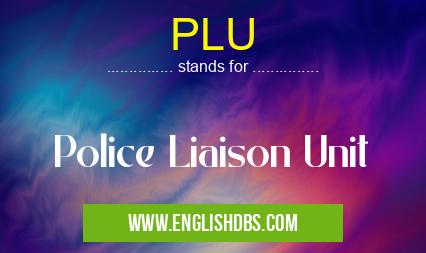What does PLU mean in POLICE
PLU stands for Police Liaison Unit. It is a specialized unit within law enforcement agencies that serves as a bridge between the police and the community. The main purpose of a PLU is to foster positive relationships, facilitate communication, and promote understanding between the two entities.

PLU meaning in Police in Governmental
PLU mostly used in an acronym Police in Category Governmental that means Police Liaison Unit
Shorthand: PLU,
Full Form: Police Liaison Unit
For more information of "Police Liaison Unit", see the section below.
» Governmental » Police
Role and Responsibilities
- Community Outreach: PLUs engage in proactive community outreach programs, such as attending neighborhood meetings, attending community events, and conducting workshops to build trust and establish a rapport with residents.
- Issue Resolution: They act as mediators between the community and the police, facilitating the resolution of issues and concerns. PLUs can help address complaints, listen to concerns, and provide information about police policies and procedures.
- Information Sharing: PLUs serve as a conduit for information sharing between the community and the police. They gather feedback from residents and relay it to the police department, providing valuable insights into community needs and concerns.
- Community Education: They conduct educational programs on topics related to crime prevention, safety, and police-community relations. PLUs empower residents with knowledge and resources to actively participate in their own safety.
- Cultural Awareness: PLUs are trained in cultural sensitivity and diversity awareness. They strive to build relationships with diverse communities, understanding their unique perspectives and needs.
Benefits
- Improved Community Relations: PLUs help foster positive relationships between the police and the community, breaking down barriers and mistrust.
- Reduced Crime: By addressing community concerns and building trust, PLUs can contribute to reduced crime rates.
- Increased Community Engagement: PLUs empower residents to take an active role in their safety and work in partnership with the police.
- Enhanced Communication: They facilitate open and effective communication between the community and the police, ensuring that both parties are informed and heard.
- Positive Image of Law Enforcement: PLUs help promote a positive image of law enforcement by demonstrating the commitment to community engagement and problem-solving.
Essential Questions and Answers on Police Liaison Unit in "GOVERNMENTAL»POLICE"
What is a Police Liaison Unit (PLU)?
A PLU is a specialized unit within a police department that serves as a bridge between law enforcement and a specific community or organization. They are responsible for fostering positive relationships, addressing concerns, and promoting understanding between the police and the community they serve.
What are the primary responsibilities of a PLU?
The responsibilities of a PLU typically include:
- Establishing and maintaining open lines of communication between the police and the community.
- Identifying and addressing community concerns related to policing.
- Providing information and resources to community members about police policies and procedures.
- Representing the needs and perspectives of the community to the police department.
- Facilitating community-based crime prevention initiatives.
Who do PLUs typically serve?
PLUs can serve a variety of communities and organizations, including:
- Specific neighborhoods or geographic areas.
- Community groups, such as religious organizations, youth centers, and neighborhood associations.
- Schools and universities.
- Minority and underserved communities.
- Businesses and commercial districts.
How can I contact my local PLU?
The best way to contact your local PLU is to visit the police department's website or call the non-emergency police line. You can also attend community events or meetings where PLU officers may be present.
What are the benefits of having a PLU in my community?
The presence of a PLU in a community can offer several benefits, such as:
- Improved communication and understanding between the police and the community.
- Increased community engagement in crime prevention initiatives.
- Reduced crime rates and fear of crime.
- Enhanced trust and legitimacy of the police department.
Final Words: Police Liaison Units play a crucial role in bridging the gap between law enforcement and the community. By fostering positive relationships, facilitating communication, and addressing community concerns, PLUs contribute to safer neighborhoods, increased trust, and a more just society.
